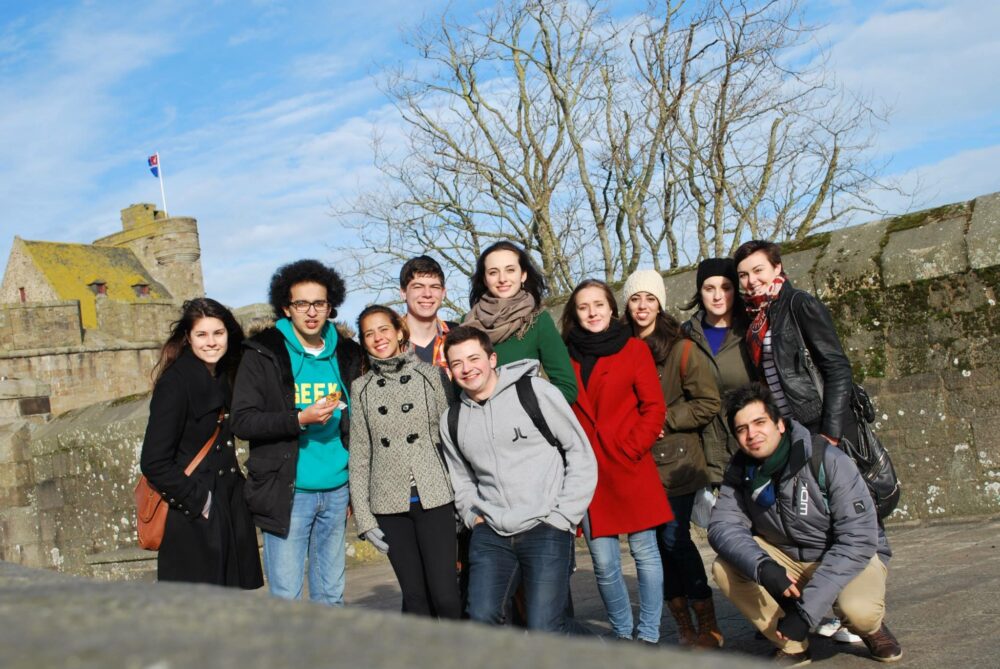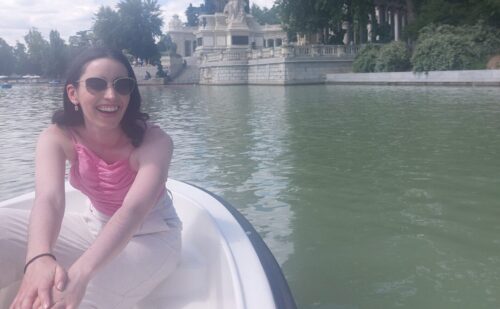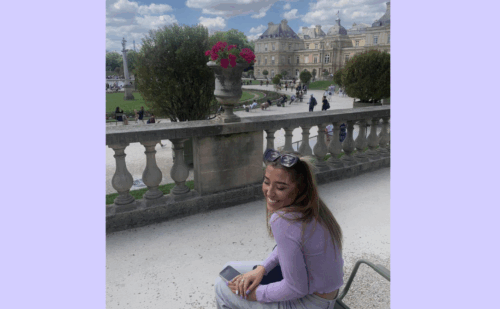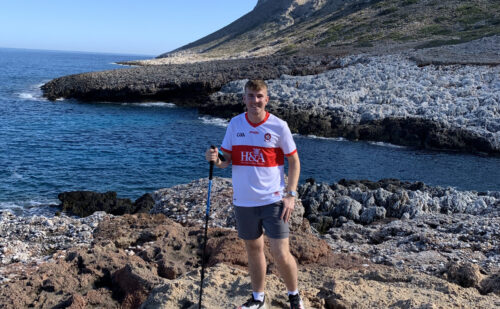“I became more mature, more independent” Aisling’s Erasmus+ Experience in France
Aisling Burke

Aisling Burke (extreme right back row) with fellow Erasmus+ colleagues in Rennes School of Business, Brittany
Seven years ago, Aisling Burke undertook an Erasmus+ study visit to Rennes School of Business in Brittany, France. Today, she is the Erasmus and Exchange Institutional Co-ordinator at Limerick Institute of Technology (LIT), which will, along with Athlone Institute of Technology, become the new Technological University of the Shannon: Midlands Midwest, on 1 October 2021.
As if that wasn’t enough, Aisling is also a PhD student at LIT.
“When I started college, I wasn’t exactly sure what I wanted to do. I knew that I was good at business and that I was interested in marketing, so I decided to enrol LIT’s Business & Humanities Faculty. In my first and second year, I was lucky to have two French teachers that were extremely passionate about the Erasmus programme and encouraged me to attend LIT’s closest partner college at the time, Rennes School of Business. I am incredibly happy I did, as it was one of the greatest experiences of my college life.”
It wasn’t all plain sailing for the Tipperary native.
“The first two weeks of homesickness are nothing to be scoffed at, and I spent the time wondering if I had made a huge mistake. I was making new friends, but what about everyone at home? Living abroad meant that my family and friends weren’t within driving distance to help with problems. I couldn’t ask for help navigating a new city. If I was late waking up, it was on me to find a way to get across the city to college quickly. When my roommates and I needed our semester transport passes, it was up to us to find the right buses to the kiosk where we could apply for the passes. These hurdles outside of the classroom made me grow up much more than I would have done if I had remained in Ireland. In the space of a semester, I became more mature, more independent … and I learned how to cook for myself!”
“At Rennes SB itself, I studied subjects both similar and dissimilar to what I was used to at LIT. Where I thrived on subjects I had experience in, like Macroeconomics and Corporate Social Responsibility, I was challenged by more novel ideas, like how to manage information systems, portfolio analysis, B2B marketing and sourcing strategies. Add to the challenge of new subjects – the process of learning how to learn in a different country. Where I had been used to very relaxed attitudes in Irish classrooms, I was suddenly in a classroom of a private business school in France, where suits and dresses were the norm. While most of us adapted as best we could, I will never forget the cultural faux pas of one of our Irish friends showing up to an important day of presentations in his tracksuit pants, and the hilarious panic of sending him home to change into a suit in time for his group to present!
Despite the challenges of the first weeks, once I adapted, I thrived and enjoyed the learning that I may not have experienced otherwise. I was lucky to have professors that reminded me of those in LIT – teachers that loved their subjects, and that challenged and supported us in equal measure. I found myself being especially enraptured by the extremely multicultural classroom putting forward diverse viewpoints on how different ideas are approached around the world. With my friends from North America, South America, Europe and Africa, we butted heads on how group assignments are approached in our different countries and we came together around each other’s stoves to try dishes from our home countries.”
“Following my Erasmus, I pursued learning as much as I could about all things international. I returned to LIT and continued to thrive when my lecturers introduced international and multicultural issues into our subjects. I was presented with an award for my work on cultural assignments at graduation, much to my delight.
When I finished my degree in LIT, I went straight to University of Limerick’s MSc in International Management and Global Business to keep my learning about all things international going. My Master’s dissertation on international education and university ranking systems had its roots in my multicultural experience on Erasmus and my eagerness to learn how international education ticked.
Both my experience working with multicultural groups on Erasmus and this great interest in international education led me to being hired to work in UL Global as an Outgoing Erasmus+ Administrator. From there, I was welcomed back to LIT to manage the same Erasmus+ programme that I once benefited from as an LIT student. Now, I am lucky to support students that are asking the same questions that I had. I strive to give them the same encouragement that I received, because I know from experience what a difference Erasmus can make.
While I’m helping my students, I keep growing and keep trying to learn more. One of the French teachers that encouraged me to go abroad back then is now supporting my new PhD journey, where I hope to examine ways we can encourage even more cultural experiences here at home. As I research and learn new perspectives on cross-cultural issues, I often think of getting to try those dishes from around the world in my friends’ kitchens in France or the almost-scandal of our friend missing the cultural mark ahead of his presentation. As I continue to learn and continue to help students, I’m each day grateful for those few months in France and for the difference that Erasmus made on me.”

Want to have your Erasmus+ experience featured? Get in touch!


